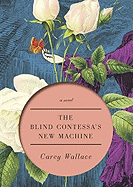

The jacket copy for Carey Wallace's lovely novel describes it as, among other things, "an enchanting confection," which is true enough, but just part of the story. At barely 200 pages (and small-format), The Blind Contessa's New Machine is as compact as it is sweet and delicately crafted; it is also surprisingly wise and surefooted for a debut novel by a young author.
The story takes place in early 19th-century Italy, but the landscape, full of lemon trees, white rosebushes and bramble-strewn paths, has the timeless feel of a fairytale. The titular contessa is Carolina Fantoni, a dreamy girl who loves nothing more than staring out upon the lake her father has built on his spacious grounds. As the novel opens (in scenes that have the faint tang of García Márquez and Laura Esquivel), Carolina is going blind but cannot convince anyone of it; not her doting but obtuse father, her dismissive, distant mother or even her passionate fiancé, Pietro, a dashing lothario who ignites her senses but not her imagination. The only person who does believe Carolina is Turri, the eccentric inventor who has been her friend since childhood and who shares her love of the natural world.
Carolina's blindness becomes complete soon after her wedding, forcing her to stay in the bedroom of her new (but already disenchanted) husband's home, dependent on her mean-spirited servant, Liza. After some months of complete darkness, Carolina begins to see--and travel--in her dreams, and Turri, who is also married and the father of a son, invents a machine (a proto-typewriter) on which she can write letters. Turri's gift sparks the latent ardor between the two and they begin a passionate love affair that will--of course--have grievous consequences.
Wallace's writing is truly exquisite, from her pointillist descriptions of the flora and fauna surrounding Carolina to her watercolor dreamscapes, and, most difficult to achieve, the pitch-perfect rendering of Carolina's hopes and fears. Even more impressive, however, is Wallace's ability to mine the depths of her central metaphor—blindness--for all its worth without ever becoming precious or contrived. The passages that detail Carolina's gradual loss of sight, photon by photon, are alone worth the price of the book.
Wallace is clearly a gifted writer and a wonderful storyteller. Her first novel, full of heart, wit and intelligence, is a remarkable accomplishment and gives us great reason to look forward to her next.--Debra Ginsberg
Shelf Talker: An exquisite gem of a novel that blends fairytale and real-world emotion in the story of a blind contessa, her lover and her writing machine.

